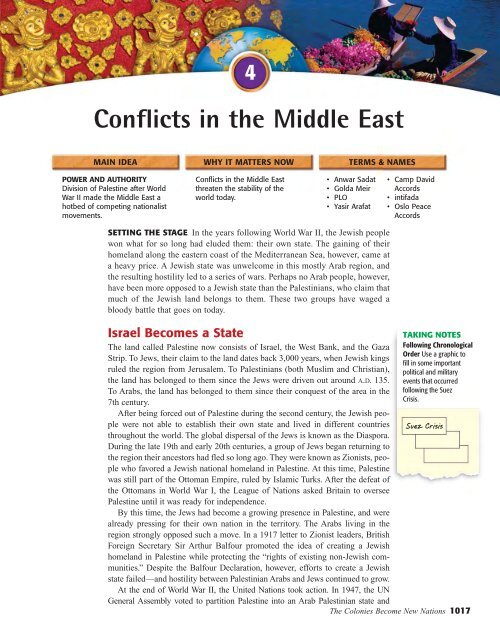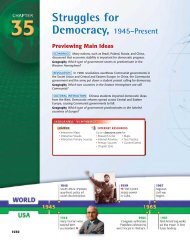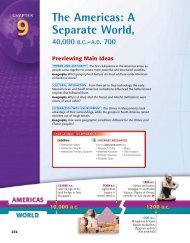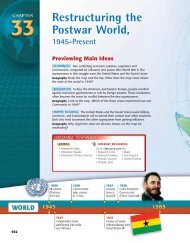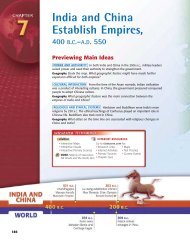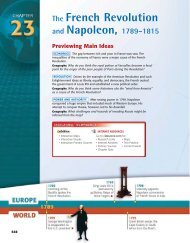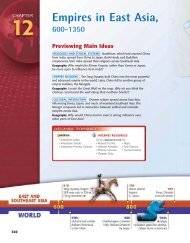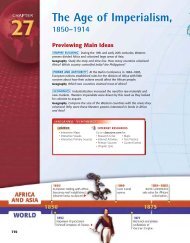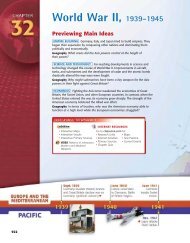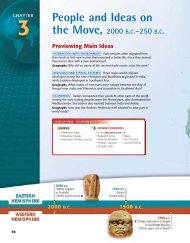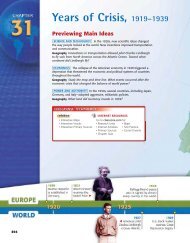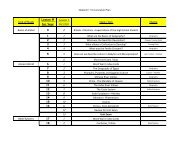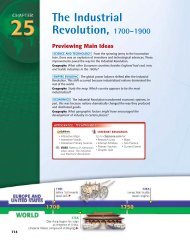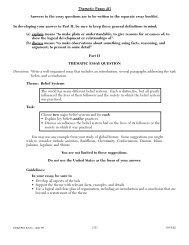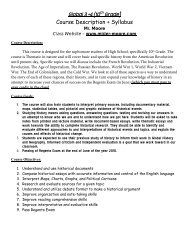Chapter 34 - First
Chapter 34 - First
Chapter 34 - First
You also want an ePaper? Increase the reach of your titles
YUMPU automatically turns print PDFs into web optimized ePapers that Google loves.
MAIN IDEA WHY IT MATTERS NOW TERMS & NAMES<br />
POWER AND AUTHORITY<br />
Division of Palestine after World<br />
War II made the Middle East a<br />
hotbed of competing nationalist<br />
movements.<br />
4<br />
Conflicts in the Middle East<br />
Conflicts in the Middle East<br />
threaten the stability of the<br />
world today.<br />
• Anwar Sadat<br />
• Golda Meir<br />
• PLO<br />
• Yasir Arafat<br />
SETTING THE STAGE In the years following World War II, the Jewish people<br />
won what for so long had eluded them: their own state. The gaining of their<br />
homeland along the eastern coast of the Mediterranean Sea, however, came at<br />
a heavy price. A Jewish state was unwelcome in this mostly Arab region, and<br />
the resulting hostility led to a series of wars. Perhaps no Arab people, however,<br />
have been more opposed to a Jewish state than the Palestinians, who claim that<br />
much of the Jewish land belongs to them. These two groups have waged a<br />
bloody battle that goes on today.<br />
• Camp David<br />
Accords<br />
• intifada<br />
• Oslo Peace<br />
Accords<br />
Israel Becomes a State<br />
TAKING NOTES<br />
The land called Palestine now consists of Israel, the West Bank, and the Gaza Following Chronological<br />
Order Use a graphic to<br />
Strip. To Jews, their claim to the land dates back 3,000 years, when Jewish kings<br />
fill in some important<br />
ruled the region from Jerusalem. To Palestinians (both Muslim and Christian), political and military<br />
the land has belonged to them since the Jews were driven out around A.D. 135. events that occurred<br />
To Arabs, the land has belonged to them since their conquest of the area in the following the Suez<br />
7th century.<br />
Crisis.<br />
After being forced out of Palestine during the second century, the Jewish people<br />
were not able to establish their own state and lived in different countries Suez Crisis<br />
throughout the world. The global dispersal of the Jews is known as the Diaspora.<br />
During the late 19th and early 20th centuries, a group of Jews began returning to<br />
the region their ancestors had fled so long ago. They were known as Zionists, people<br />
who favored a Jewish national homeland in Palestine. At this time, Palestine<br />
was still part of the Ottoman Empire, ruled by Islamic Turks. After the defeat of<br />
the Ottomans in World War I, the League of Nations asked Britain to oversee<br />
Palestine until it was ready for independence.<br />
By this time, the Jews had become a growing presence in Palestine, and were<br />
already pressing for their own nation in the territory. The Arabs living in the<br />
region strongly opposed such a move. In a 1917 letter to Zionist leaders, British<br />
Foreign Secretary Sir Arthur Balfour promoted the idea of creating a Jewish<br />
homeland in Palestine while protecting the “rights of existing non-Jewish communities.”<br />
Despite the Balfour Declaration, however, efforts to create a Jewish<br />
state failed—and hostility between Palestinian Arabs and Jews continued to grow.<br />
At the end of World War II, the United Nations took action. In 1947, the UN<br />
General Assembly voted to partition Palestine into an Arab Palestinian state and<br />
The Colonies Become New Nations 1017


